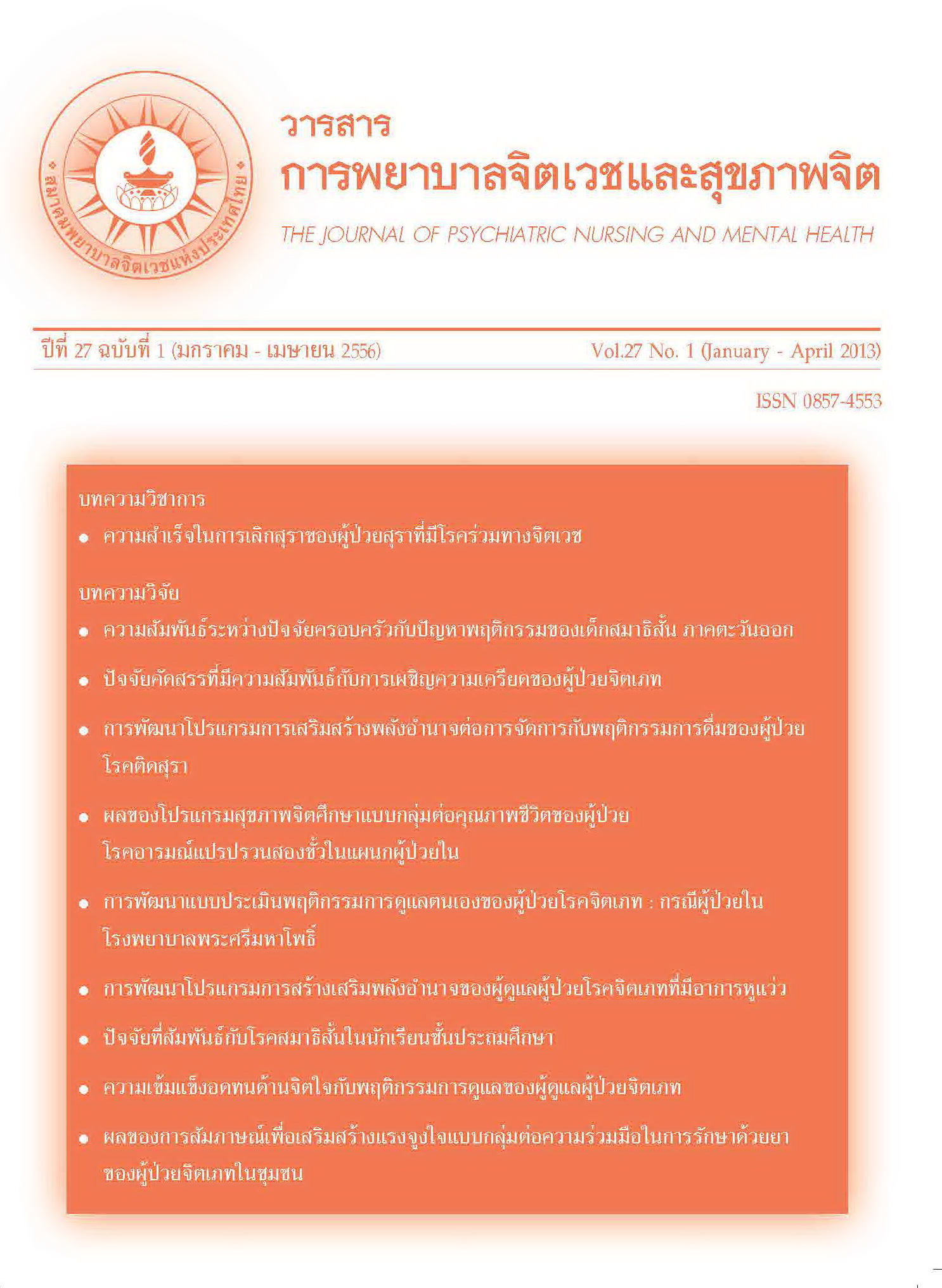ผลของโปรแกรมสุขภาพจิตศึกษาแบบกลุ่มต่อคุณภาพชีวิตของผู้ป่วย โรคอารมณ์แปรปรวนสองขั้วในแผนกผู้ป่วยใน
Main Article Content
บทคัดย่อ
บทคัดย่อ
การวิจัยในครั้งนี้เป็นการวิจัยกึ่งทดลองแบบสองกลุ่มวัดสองครั้ง โดยมีการสุ่มตัวอย่างเข้ากลุ่ม มีวัตถุประสงค์เพื่อ 1) เปรียบเทียบคุณภาพชีวิตของผู้ป่วยโรคอารมณ์แปรปรวนสองขั้วก่อน และหลังได้รับโปรแกรมสุขภาพจิตศึกษาแบบกลุ่ม 2) เปรียบเทียบคุณภาพชีวิตของผู้ป่วยโรคอารมณ์แปรปรวนสองขั้ว ระหว่างกลุ่มที่ได้รับโปรแกรมสุขภาพจิตศึกษาแบบกลุ่มกับกลุ่มที่ได้รับการดูแลตามปกติ กลุ่มตัวอย่างเป็นผู้ป่วยโรคอารมณ์แปรปรวนสองขั้วที่เข้ารับการรักษาในแผนกผู้ป่วยในของสถาบันจิตเวชศาสตร์สมเด็จเจ้าพระยา จำนวน 40 คน ได้รับการจับคู่ตามคุณลักษณะของเพศ ระดับคะแนนอาการซึมเศร้า และระดับคะแนนอาการแมเนีย แล้วถูกสุ่มเข้าสู่กลุ่มทดลองจำนวน 20 คน และกลุ่มควบคุมจำนวน 20 คน กลุ่มทดลองได้รับโปรแกรมสุขภาพจิตศึกษาแบบกลุ่มที่ผู้วิจัยสร้างขึ้น ส่วนกลุ่มควบคุมได้รับการดูแลตามปกติ เครื่องมือที่ใช้ในการวิจัย คือ 1) โปรแกรมสุขภาพจิตศึกษาแบบกลุ่ม 2) แบบวัดความรู้เรื่องโรคอารมณ์แปรปรวนสองขั้ว 3) แบบวัดการรับรู้เหตุการณ์ที่ก่อให้เกิดความรู้สึกเชิงลบ 4) แบบประเมินคุณภาพชีวิตฉบับย่อขององค์การอนามัยโลก 5) แบบประเมินอาการซึมเศร้า และ 6) แบบประเมินอาการแมเนีย
ผลการวิจัยสรุปได้ดังนี้
1.คะแนนเฉลี่ยคุณภาพชีวิตของผู้ป่วยโรคอารมณ์แปรปรวนสองขั้วในแผนกผู้ป่วยในหลังได้รับโปรแกรมสุขภาพจิตศึกษาแบบกลุ่มสูงกว่าก่อนได้รับโปรแกรมสุขภาพจิตศึกษาแบบกลุ่มอย่างมีนัยสำคัญทางสถิติที่ระดับ 0.05 (t= -8.31)2. คะแนนเฉลี่ยคุณภาพชีวิตของผู้ป่วยโรคอารมณ์แปรปรวนสองขั้วในแผนกผู้ป่วยในหลังได้รับโปรแกรมสุขภาพจิตศึกษาแบบกลุ่มสูงกว่ากลุ่มที่ได้รับการดูแลปกติอย่างมีนัยสำคัญทางสถิติที่ระดับ 0.05 (t = 7.25)
คำสำคัญ : โปรแกรมสุขภาพจิตศึกษาแบบกลุ่ม, ผู้ป่วยโรคอารมณ์แปรปรวนสองขั้ว, คุณภาพชีวิต
Abstract
The purposes of this quasi-experimental research using the pretest-posttest randomized control group design were: 1) to compare the quality of life in bipolar disorder patients before and after received group psychoeducation program, and 2) to compare the quality of life in bipolar disorder inpatients who received group psychoeducation program and those who received regular caring activities. The sample consisted of 40 were bipolar disorder patients, who sought for received services in our patients department, Somdetchaopraya hospital. The samples were matched pair according to gender, depression scores and mania scores, and then randomly assigned into experimental group and control group, 20 subjects in each group. The experimental group received group psychoeducation program. Whereas the control group received regular caring activity. The research instruments consisted of: 1) group psychoeducation program, 2) Knowledge on Bipolar disorder test, 3) The Negative Event Scale, 4) WHO-BRIEF THAI , 5) Montgomery Asberg Depression Rating Scale, and 6) Young Mania Rating Scale.
Major finding were as follows:
1. The score on quality of life in bipolar disorder inpatients after received group psychoeducation program was higher than that before the experiment (t = -8.31 , p< 0.05).
2. The score on quality of life in bipolar disorder inpatients after received group psychoeducation program was higher that those who received the regular caring activity (t = 7.25, p< 0.05).
Keywords : Group psychoeducation program, Bipolar disorder patients, Quality of life
Article Details
บทความที่ได้รับการตีพิมพ์แล้ว เป็นลิขสิทธิ์ของสมาคมพยาบาลจิตเวชแห่งประเทศไทย


